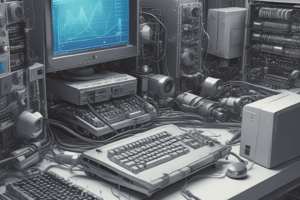Podcast
Questions and Answers
¿Cuál de las siguientes opciones se refiere al 'cerebro' de la computadora?
¿Cuál de las siguientes opciones se refiere al 'cerebro' de la computadora?
- Procesador (correct)
- Memoria RAM
- Dispositivos de entrada
- Almacenamiento secundario
¿Qué tipo de memoria es volátil y se utiliza para almacenamiento temporal?
¿Qué tipo de memoria es volátil y se utiliza para almacenamiento temporal?
- Memoria ROM
- Procesador
- Almacenamiento secundario
- Memoria RAM (correct)
¿Cuál de las siguientes opciones se considera almacenamiento a largo plazo en una computadora?
¿Cuál de las siguientes opciones se considera almacenamiento a largo plazo en una computadora?
- Memoria RAM
- Dispositivos de entrada
- Almacenamiento secundario (correct)
- Procesador
¿Cuál de los siguientes no es un componente de hardware de una computadora?
¿Cuál de los siguientes no es un componente de hardware de una computadora?
¿Qué tipo de dispositivo se utiliza para introducir datos en una computadora?
¿Qué tipo de dispositivo se utiliza para introducir datos en una computadora?
¿Qué componente interno de la computadora se encarga de la gráfica?
¿Qué componente interno de la computadora se encarga de la gráfica?
¿Qué tipo de software se utiliza para desarrollar y ejecutar programas?
¿Qué tipo de software se utiliza para desarrollar y ejecutar programas?
¿Qué sistema operativo es un software de código abierto basado en Unix?
¿Qué sistema operativo es un software de código abierto basado en Unix?
¿Qué tipo de dispositivo se utiliza para ingresar información a la computadora?
¿Qué tipo de dispositivo se utiliza para ingresar información a la computadora?
¿Qué tipo de dispositivo se utiliza para producir información en la computadora?
¿Qué tipo de dispositivo se utiliza para producir información en la computadora?
Flashcards are hidden until you start studying
Study Notes
Introduction
Hardware and software are two fundamental components of any computer system. They work together to enable computers to perform a wide range of tasks. Hardware refers to the physical components of a computer, such as the processor, memory, and storage devices. Software, on the other hand, is the set of instructions that tells the computer what to do. In this article, we will discuss these components in detail, focusing on computer hardware, computer components, operating systems, and system software.
Computer Hardware
Computer hardware consists of physical components that make up a computer system. These include:
-
Processor: Also known as the CPU (Central Processing Unit), the processor is the brain of the computer. It performs calculations, executes instructions, and manages data flow between components.
-
Memory: Memory is where data is stored temporarily so that the processor can access it quickly. The two main types of memory are RAM (Random Access Memory) and ROM (Read-Only Memory). RAM is volatile and is used for temporary storage, while ROM is non-volatile and contains permanent instructions.
-
Storage: Computer storage is where data is stored long-term. There are two main types: primary storage (hard disk drives or SSDs) and secondary storage (optical drives, USB drives, or external hard drives).
-
Input Devices: These are used to enter data into the computer. Examples include keyboards, mice, and touchscreens.
-
Output Devices: These devices display or produce information. Examples include monitors, printers, and speakers.
Computer Components
Computer components are the building blocks of a computer system. They can be classified into external and internal components:
External Components
External components are devices that are connected to the computer system but are not physically part of it. Examples include:
-
Input Devices: Keyboards, mice, scanners, and microphones.
-
Output Devices: Monitors, printers, and speakers.
Internal Components
Internal components are the physical parts of the computer that are housed within its casing. Examples include:
-
Motherboard: The main circuit board that connects all other components of the computer.
-
Power Supply: Converts the power from the wall outlet into a form that the computer can use.
-
Graphics Processing Unit (GPU): A specialized processor that handles graphical data, used for tasks like gaming and video editing.
-
Hard Drives or SSDs: Store data and programs, with hard drives being older and slower, and SSDs being newer and faster.
Operating Systems
An operating system (OS) is a software program that manages computer hardware and software resources and provides common services for computer programs. Examples of operating systems include:
-
Microsoft Windows: A widely used operating system for personal computers.
-
MacOS: Operating system developed by Apple Inc. for its Mac computers.
-
Linux: An open-source operating system based on Unix, popular among programmers and server administrators.
-
iOS: Operating system developed by Apple for its mobile devices, such as iPhones and iPads.
-
Android: Operating system developed by Google for mobile devices, such as smartphones and tablets.
System Software
System software is a type of software that manages and controls computer hardware and software. It includes:
-
Operating Systems: The main part of system software, which controls and coordinates computer hardware and runs other software.
-
Device Drivers: Software programs that control specific hardware devices, such as printers, scanners, or graphics cards.
-
Utility Software: Programs that perform specific tasks, like managing system resources, optimizing performance, or maintaining the computer's health.
-
Programming Software: Software used to develop and run programs, such as compilers, interpreters, and debuggers.
In conclusion, understanding the relationship between hardware and software is essential for anyone working with computers. While hardware is the physical foundation that makes computing possible, software is the set of instructions that tells the hardware what to do. Together, they enable computers to perform a wide range of tasks, from simple word processing to complex scientific simulations.
Studying That Suits You
Use AI to generate personalized quizzes and flashcards to suit your learning preferences.




